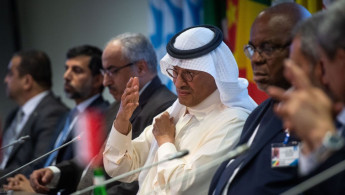OPEC+ members unanimously support oil production cut, cite 'economic reasons'
OPEC+ members announced their support for a steep cut in oil production following the United States' accusation against Saudi Arabia of coercing other nations to back the move.
The decision entailed that starting in November, production will be cut to two million barrels of oil a day.
Bahrain and Oman released statements on Sunday claiming the decision by OPEC+ was made following a "consensus" after Washington accused Riyadh of pressuring smaller nations to agree to the oil production cut.
"The decision was made following specialised technical studies related to global oil market developments," Bahrain's special envoy for climate affairs, Mohamed bin Mubarak bin Daina, said.
"The recent decision of OPEC+ to cut production is in line with its previous decisions in terms of its reliance on market data and its variables, which was important and necessary to reassure the market and support its stability," Oman's energy ministry said via Twitter.
Kuwait's Petroleum Corporation's CEO, Sheikh Nawaf Saud Al-Nasser Al-Sabah, also welcomed the decision to reduce oil production, emphasising the corporation's eagerness to meet the demands of its customers globally, according to comments made to Kuwait News Agency.
Saudi Arabia's defence minister also said the decision by OPEC+ to limit output was taken unanimously and for purely economic reasons.
Secretary-General of OPEC Haitham Al-Ghais mirrored the claims, saying the recent decision to cut back oil production was based on a performance study of the global economy and was "away from politics."
Washington had pointed fingers at Riyadh, accusing the move of having ulterior motives, which rushed in statements from OPEC+ members claiming that the reasons were based on 'economic considerations.'
Following the rise in global energy prices after Russia invaded Ukraine earlier this year, Washington has attempted to sway members of the oil-producing group, namely Saudi Arabia, to bump up oil production.
On Thursday, U.S. National Security Council spokesman John Kirby claimed that "more than one" OPEC+ member privately expressed that they felt coerced by Saudi Arabia into agreeing with the cut.
Kirby added that the scaleback would also "increase Russian revenues and blunt the effectiveness of sanctions."
Saudi Arabia's Minister of Defence Prince Khalid bin Salman responded to these accusations of supporting Russia.
We are astonished by the accusations that the kingdom is standing with Russia in its war with Ukraine. It is telling that these false accusations did not come from the Ukrainian government. https://t.co/YIz441YinT
— Khalid bin Salman خالد بن سلمان (@kbsalsaud) October 16, 2022
"We are astonished by the accusations that the kingdom is standing with Russia in its war with Ukraine. It is telling that these false accusations did not come from the Ukrainian government,” the defence minister tweeted.
On Thursday, the International Energy Agency (IEA) said that the oil producer group's move to limit output could push the global economy into recession
"The relentless deterioration of the economy and higher prices sparked by an OPEC+ plan to cut supply are slowing world oil demand," the IEA, which includes members such as the United States and other major energy-consuming nations, said.





 Follow the Middle East's top stories in English at The New Arab on Google News
Follow the Middle East's top stories in English at The New Arab on Google News


